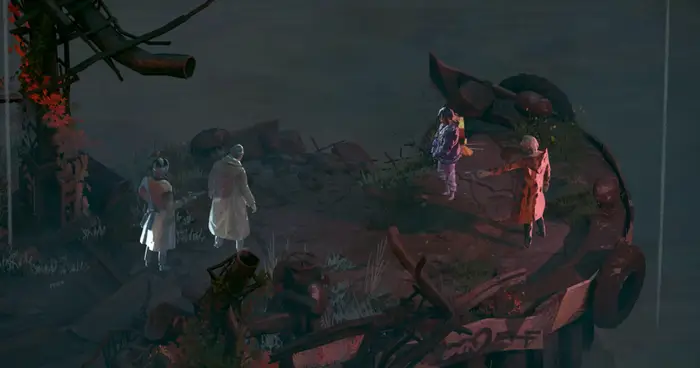Zero Parade is a lot to ask creator Za/um. It’s a spy CRPG. This is a character study of the burnt, burnt out “fallen” that you play. It’s a “story about failure and regret” before being shown very early footage of a moving game, as I said.
It’s also the most overt disco-like in what’s very naked, the successor to Disco Elysium, perhaps set to be a strangely crowded field. Some people like it. But it’s strange to see Zero Parade clinging to the past.
Herschel begins the game as “quasi-ex spy” in the Communist Party’s superblock, one of three factions. Caught in the middle is the place of the bangled OP that sent Herschel to the purgatory of the desk, an ostensibly democratic sovereignty of the Portophilo, now ordered to return to investigate a new mystery.
Upon arrival, her most urgent concerns, and even the main focus of the game, is reassembling her old crew. Therefore, to succeed, you need to repair the crushed relationship. The Za/um process may not be possible for anyone if it is fully checked. Or, certainly, if you block yourself a settlement.
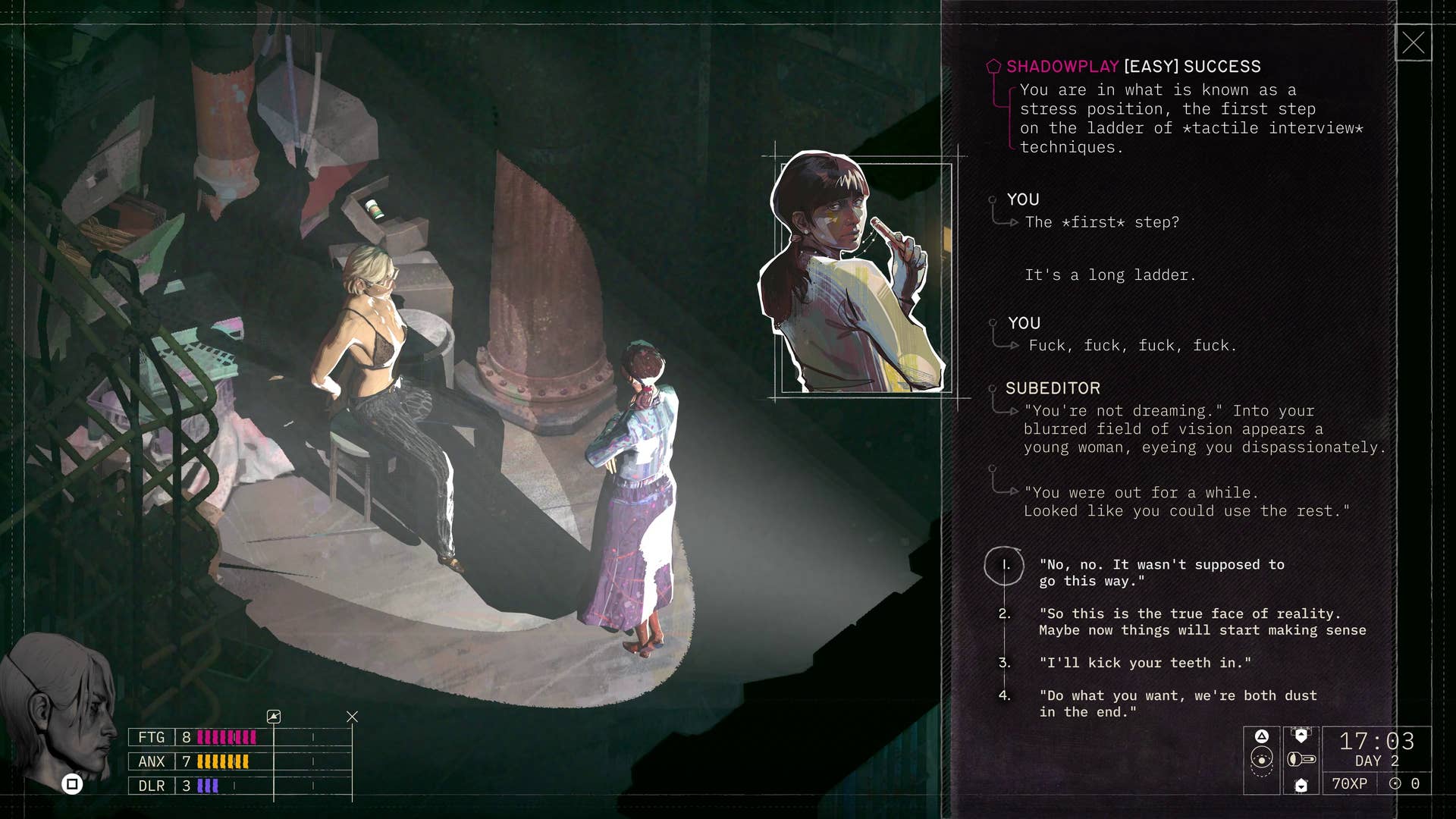
Failure is both a zero parade and it’s not a big deal. It is the background radiation of Herschel’s life. She has failed previously, and now she is given a last chance, she is afraid to fail again. Portofiro is also a country with the best years behind it, and many of its residents packed into rotten slums that could potentially attend untapped areas of Martiners. However, as a game state, failure rarely means an end. This is because it is possible to continue without fail, while irreparably stopping the main goal.
There was already this element that caused the disco skill check to fail. This is followed by other zero parades. As Herschel approaches a table covered in hats and scarves in search of disguise, a bad dice roll comes to Don with an oversized headpiece in a cartoon mascot costume. Tradecraft. But, as the developers said, “moving forward” has been deemed sufficiently viable enough that the story will bend and fork, following both your intentional choice and the miserable misfire.
I was told anyway. The preview didn’t really show much of this beyond the hats. I’ve seen the pressure a lot, but it’s a trio of reverse health bars that measure the stress of being the only agent that everyone hates. The gauge of fatigue, anxiety and delirium fills up depending on your choice, and if one of them is full, it has potentially fatal consequences.
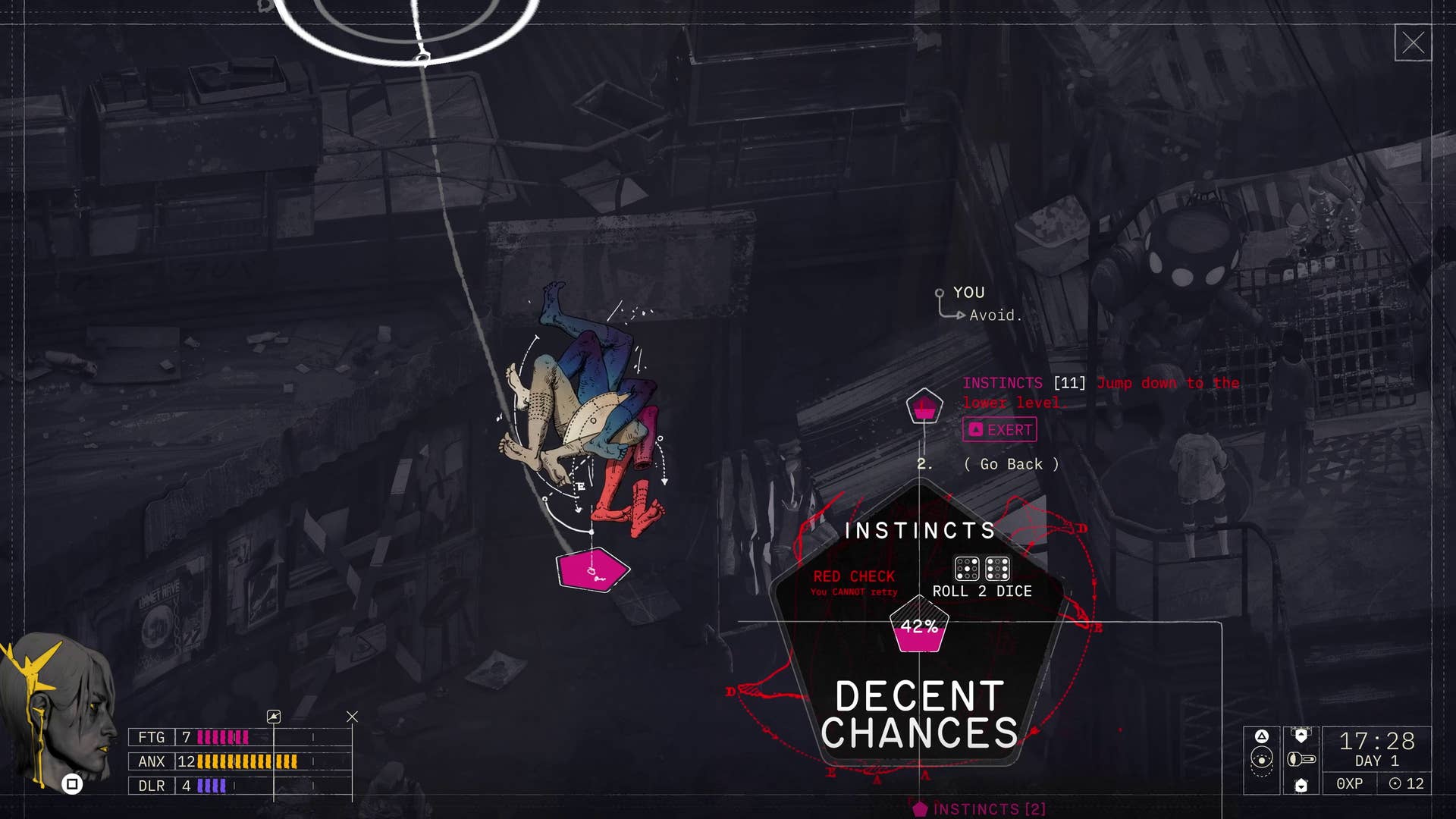
For example, good sleep can reduce it, but interaction with skill checking means some opportunities may be too good do not have It causes nervous fatigue to Herschel. If your check appears unlikely, you can choose to “escape” yourself to increase your chances of success, such as destroying a door lock, rather than looking for another entrance. but! It is also a good idea to raise one of your pressures and determine whether an improved opportunity is worth the physical and mental sacrifice.
The conditioning menu also offers an additional option called “Thought Cabinet Plus Plus Plus.” Here, like Harry Du Bois’s mental aspects, you gather ideas and counterminate for skill points adjustments. In addition to cementing Herschel further as a more contradictory soul than the disco amnestic detective, conditioning seems to offer another path to roleplay, as strengthening or punishing ideas always makes different tweaks to different skills.
Come to think of it, Harry’s skill was primarily to define him as a police officer, but some of Herschel’s work has absolutely nothing to do with her day’s work. That’s not that they can’t help checking, but they can also invest just to shape who she is as a person. For example, Technoflex represents her inner hardware nerd, flapping up when she handles the cassette or enjoys the heavy clicks of an old machine.
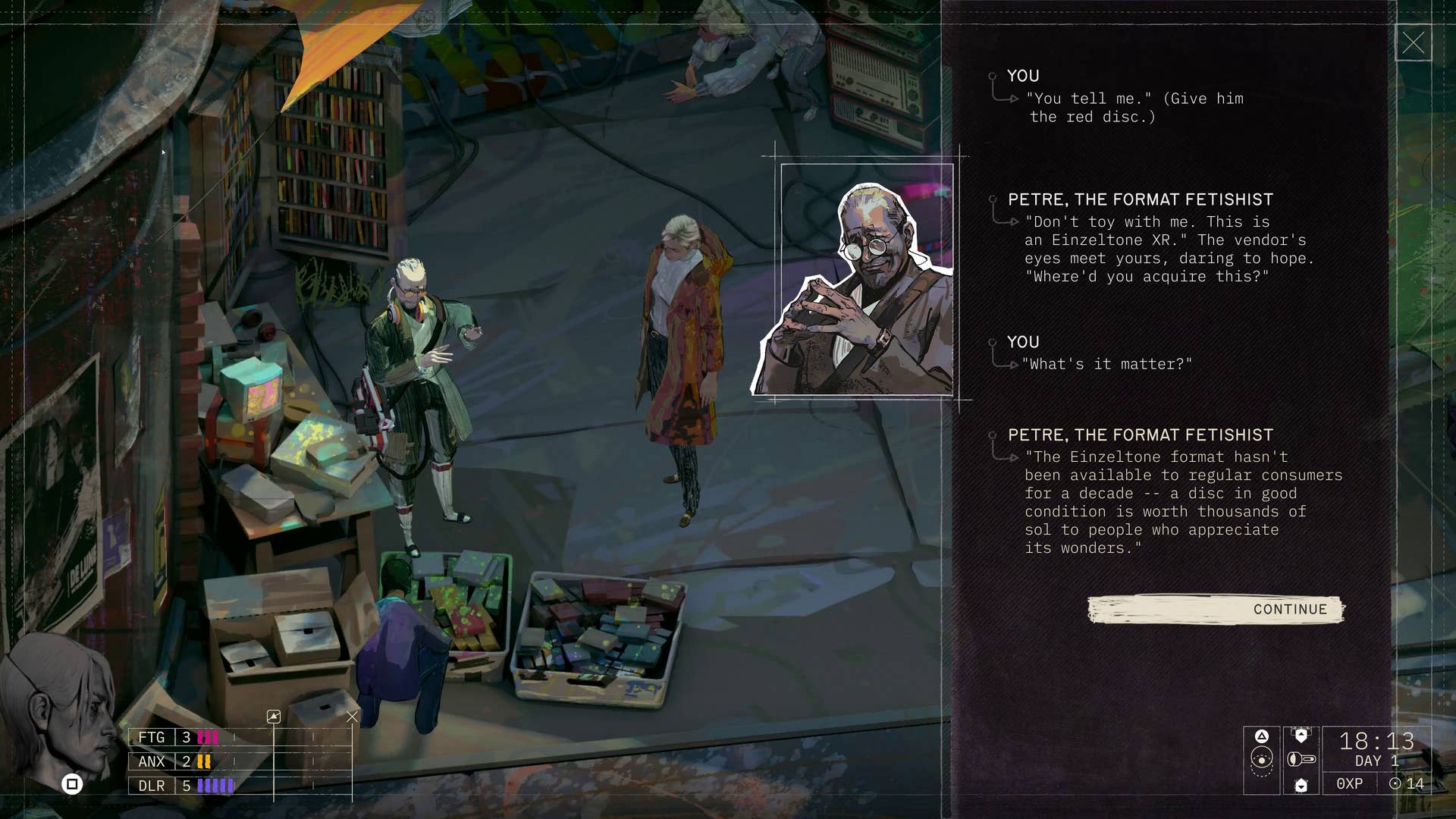
I support one, Herschel stuffing it all, opening a radio repair shop and peacefully understand the outline of a broken speaker cone. Instead, she also thrusts into what Za/um invokes dramatic encounters: faster pace, more obviously dangerous pseudo-action sequences, fitting for a spy thriller. It would be nice to hear that CRPG purists were wondering if they had stayed a little, judging by the rough version of the dramatic encounters they saw in the preview, they were navigating the text and dice roll decisions. Too much He is faithful to the ceremony. In the scene, Herschel is intended to wobble his tail, but the tension evaporates in seconds due to the obvious lack of pressure for time (or visible threat).
Still, it’s a prototype build and Zero Parade doesn’t even have a release date, so I think there are times when we inject dramatic encounters with a bit of extra drama. What’s more, at least it’s an attempt at something new. The game’s skills, conditioning, and even the idea of surviving cockups all expands on Za/UM’s previous work, but it’s not always clear whether Zero Parade is inspired by or seen by Disco Elysium.
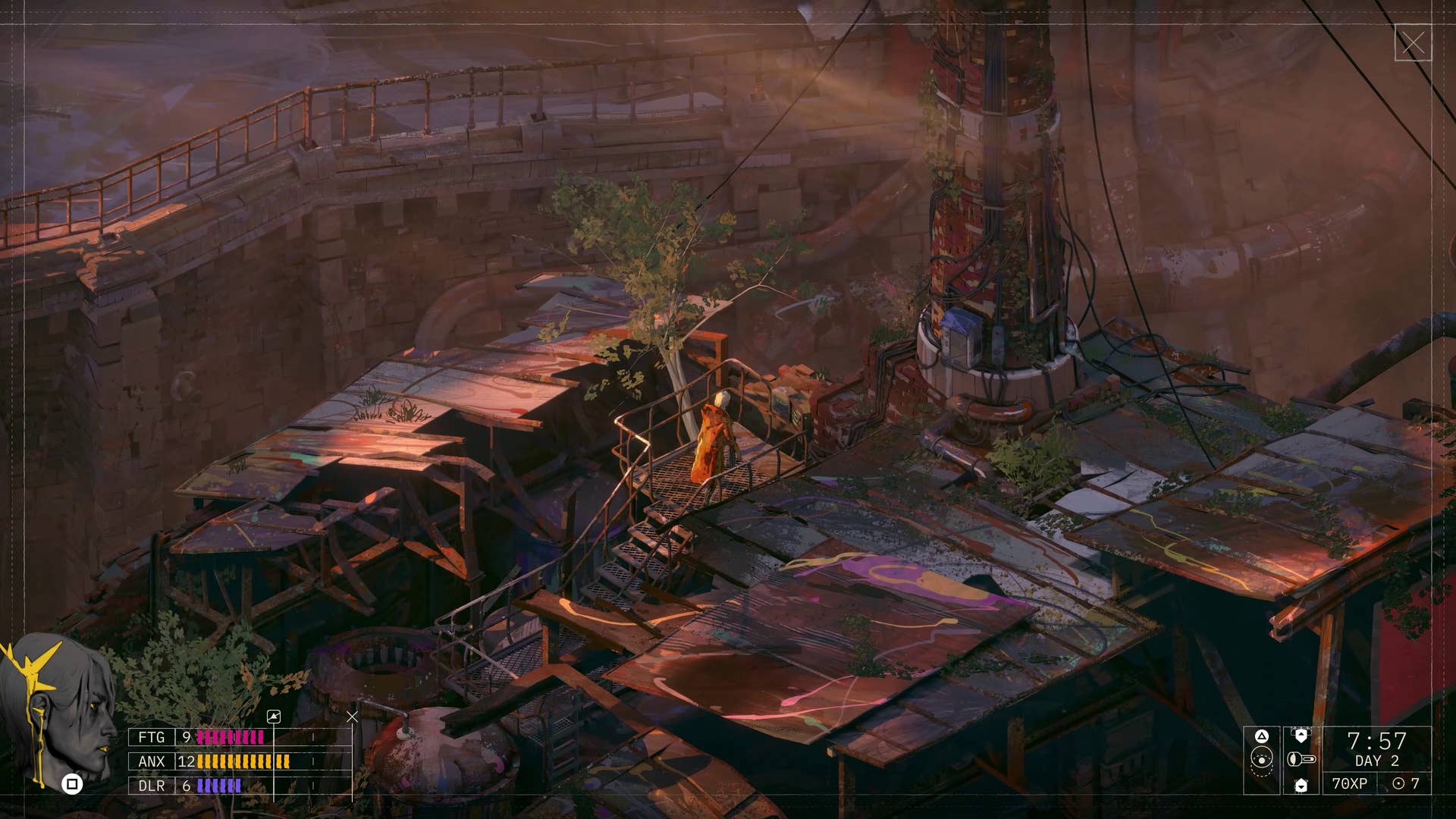
Aesthetically, it is very similar to disco erythium. The way characters, including yourself, speak, sounds like Disco Elysium. The way you interact with the world and try to influence those people is very similar to Disco Elysium. It even recycles the conflict between communism and fascism, while once again suggesting that centrism may be worse than both, through the sight of Portophilo’s doom.
It feels strange in itself when you think of “Hmm, that’s more disco erythium” in a disadvantageous term. Before the internal burst of Za/UM, there was a time when half of the PC owners on Earth had a little distance away from Estonia’s hands for Disco 2: Elysium. But realistically, this is a very different Za/um from what existed in 2019. It still has the right and the means to show us what we can do, but Zero Parade takes a great risk by exchanging many glories from the past.
(TagStoTRASSLATE) Zero Parade: Dead Spy (T) PC (T) Preview (T) RPG (T) ZA/UM


